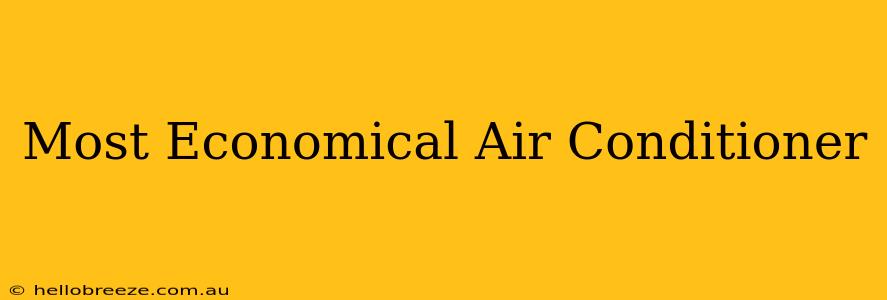Summer's heat can be brutal, but the cost of keeping your home cool shouldn't break the bank. Finding the most economical air conditioner is a smart move, both for your wallet and the environment. This guide will walk you through choosing the right AC unit to maximize your savings and minimize your energy bills.
Understanding Energy Efficiency in Air Conditioners
Before diving into specific models, it's crucial to understand how air conditioner efficiency is measured. The SEER rating (Seasonal Energy Efficiency Ratio) is the key metric. A higher SEER rating means the AC uses less energy to produce the same amount of cooling. The higher the SEER rating, the more energy-efficient and economical your air conditioner will be. Look for models with SEER ratings of 16 or higher; units with SEER ratings of 20 or above are considered very efficient.
Factors Affecting Air Conditioner Efficiency:
- Size: An air conditioner that's too small will work harder and consume more energy. Conversely, one that's too large will cycle on and off frequently, also wasting energy. Proper sizing is crucial for efficiency. A professional assessment is highly recommended.
- Installation: Improper installation can significantly reduce efficiency. Ensure your unit is installed by a qualified technician.
- Maintenance: Regular maintenance, including filter changes and coil cleaning, is essential for optimal performance and energy savings.
- Type of AC: Window units generally have lower SEER ratings than central air conditioning systems or ductless mini-splits. However, advancements in window unit technology are closing this gap.
Types of Economical Air Conditioners: A Comparison
Several types of air conditioners offer good energy efficiency. Let's compare the most economical options:
1. Window Air Conditioners:
- Pros: Affordable upfront cost, easy installation.
- Cons: Generally lower SEER ratings than other options, less efficient for cooling larger spaces.
- Best for: Small to medium-sized rooms in apartments or houses.
2. Ductless Mini-Split Systems:
- Pros: High SEER ratings, zone control (cool specific areas), energy-efficient.
- Cons: Higher initial cost than window units, requires professional installation.
- Best for: Homes without existing ductwork, or for targeted cooling in specific areas.
3. Central Air Conditioning Systems:
- Pros: Cools the entire home evenly, can be highly efficient with high-SEER models.
- Cons: High initial cost, requires extensive installation, less energy efficient if the ductwork is poorly sealed or insulated.
- Best for: Whole-house cooling in homes with existing ductwork.
Tips for Saving Even More Money:
- Use a programmable thermostat: Set your thermostat to a higher temperature when you're away or asleep.
- Seal windows and doors: Prevent cool air from escaping by sealing any gaps or cracks.
- Plant trees: Strategic tree planting can provide natural shade and reduce the amount of heat entering your home.
- Regular maintenance: Keep your air conditioner clean and well-maintained.
- Consider energy rebates and incentives: Many utility companies offer rebates or incentives for purchasing and installing energy-efficient air conditioners.
Choosing the Most Economical Air Conditioner for You:
Selecting the most economical air conditioner involves considering your budget, home size, existing infrastructure, and your cooling needs. Don't hesitate to consult with HVAC professionals for personalized recommendations and to ensure your chosen unit is correctly sized and installed for maximum efficiency. Investing in an energy-efficient air conditioner is an investment in long-term savings and comfort. Remember to factor in the total cost of ownership, including installation and maintenance, when comparing options. By making an informed decision, you can stay cool all summer without breaking the bank.

